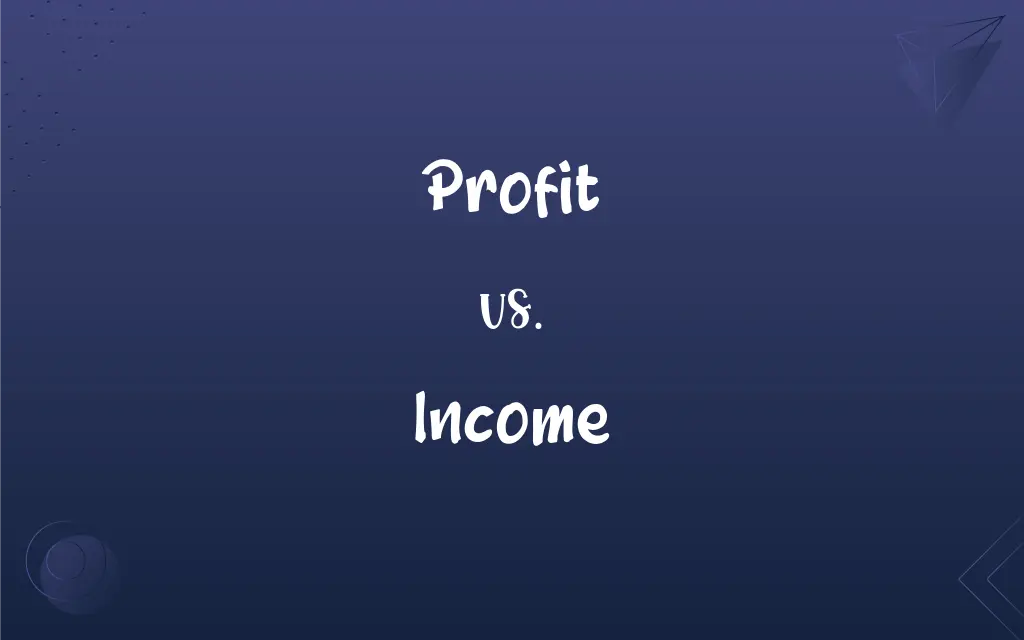Profit vs. Income: What's the Difference?
Edited by Aimie Carlson || By Harlon Moss || Updated on October 26, 2023
Profit is the financial gain after subtracting expenses from revenue, while income is the total revenue from various sources.

Key Differences
Profit refers to the financial gain achieved when the revenue from a business activity exceeds the expenses, costs, and taxes needed to sustain the activity. Income, on the other hand, is the broader term that encompasses all the money received by an individual or a business from various sources, which could include profits, salaries, interest, and other forms of earnings.
Profit is often used to evaluate the success of a business. A high profit indicates effective management and a viable business model. Income encompasses not just profits from business ventures but also includes other sources like investments, employment wages, and rent.
The calculation of profit involves deducting all costs associated with generating revenue, including operational expenses, taxes, and interest. Income is the gross total of all earnings, without necessarily subtracting expenses, though it can be divided into gross income and net income, the latter considering certain deductions.
In accounting, profit is specifically classified into various types, like gross profit, operating profit, and net profit, each serving different analytical purposes. Income is a broader term and can be broken down into categories like active income, passive income, and portfolio income, each reflecting the source and nature of earnings.
For an individual, profit might be less commonly used unless they are referring specifically to gains from business or investment. Income, however, is a term commonly used to describe the money an individual earns, regardless of the source.
ADVERTISEMENT
Comparison Chart
Definition
Financial gain after expenses
Total revenue from various sources
Context
Business-centric, often investment related
Broader, includes salaries, rent, investments
Types
Gross, operating, net
Active, passive, portfolio
Use in Evaluation
Business success indicator
Individual's financial status
Calculation
Revenue minus expenses
Sum of all earnings, pre/post deductions
ADVERTISEMENT
Profit and Income Definitions
Profit
Financial return from an investment or business activity.
Investing in renewable energy brought significant profit.
Income
Money received, especially on a regular basis.
Her primary income comes from her teaching job.
Profit
Excess of revenue over expenses.
The company reported a profit of $2 million last quarter.
Income
Earnings obtained from work, investments, or business.
Rental properties contribute significantly to his annual income.
Profit
Economic benefit gained from a transaction.
Selling the old equipment at a higher price resulted in a decent profit.
Income
Financial intake from all earning activities.
His income includes both salary and freelance writing fees.
Profit
Net earnings from operations.
The new product line dramatically increased the company's profit.
Income
Total revenue from various sources.
Diversified investments ensure a steady income stream.
Profit
Monetary gain after deducting all costs.
Despite the challenges, the event turned a substantial profit.
Income
Accumulated earnings over a period.
Her income increased significantly after the promotion.
Profit
An advantageous gain or return; benefit.
Income
The amount of money or its equivalent received during a period of time in exchange for labor or services, from the sale of goods or property, or as profit from financial investments.
FAQs
Can income include profit?
Yes, income can include profits as one of its components.
Is profit always monetary?
Yes, profit is typically measured in monetary terms.
What is profit?
Profit is the financial gain when revenue exceeds expenses.
Can income be non-monetary?
Income is usually monetary, but in-kind earnings can be considered.
Can a business survive without profit?
Temporarily, yes, but long-term profitability is crucial for survival.
Can individuals have profit without owning a business?
Yes, through investments or selling personal assets at a gain.
What is income?
Income is the total money received from various sources.
Does income always result from employment?
No, income can also come from investments, business, or other sources.
What is net profit?
Net profit is the income after all expenses, taxes, and deductions.
Is profit a component of income statement?
Yes, profit is a key component and result of an income statement.
What is gross income?
Gross income is the total income before any deductions.
Are profit and income taxed similarly?
They can be, but it depends on tax laws and specific circumstances.
Is profit more relevant for companies than individuals?
Generally, yes, as it's a primary measure of business success.
How is profit calculated?
Profit is calculated by subtracting expenses from revenue.
Can a business have income but no profit?
Yes, if expenses equal or exceed revenue, there's income but no profit.
Is high income indicative of high profit?
Not necessarily, as high income doesn't guarantee low expenses.
Can income be negative?
Typically no, but negative net income or loss is possible for businesses.
What is disposable income?
Disposable income is the money available after taxes for spending and saving.
What are passive income and active income?
Passive income is earned with minimal effort, while active income requires active work.
How do profit and income affect financial planning?
They are crucial for budgeting, investment, and savings strategies.
About Author
Written by
Harlon MossHarlon is a seasoned quality moderator and accomplished content writer for Difference Wiki. An alumnus of the prestigious University of California, he earned his degree in Computer Science. Leveraging his academic background, Harlon brings a meticulous and informed perspective to his work, ensuring content accuracy and excellence.
Edited by
Aimie CarlsonAimie Carlson, holding a master's degree in English literature, is a fervent English language enthusiast. She lends her writing talents to Difference Wiki, a prominent website that specializes in comparisons, offering readers insightful analyses that both captivate and inform.































































